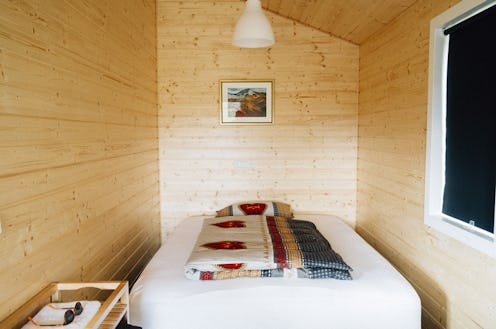
A blinking clock, your rowdy neighbors, and annoying sounds from the street — this is not a recipe for a good night's sleep. It can feel like the world is not on your side when you're trying to get some shut eye. But there are several ways to turn your bedroom into a peaceful haven and ensure yourself a restful night.
After all, you have to keep on top of your oh so very important "sleep hygiene," and having a comfy bedroom definitely helps. According to Michael Thorpy, MD, with the National Sleep Foundation, sleep hygiene includes a variety of different practices that are necessary to have normal, quality nighttime sleep, and full daytime alertness.
This includes having a regular wake and sleep pattern seven days a week (yes, this means weekend all nighters will ruin your sleep schedule). It also includes sleeping just the right amount, according to Thorphy. It varies for everyone, but you should aim for about seven to eight hours of sleep a night.
Of course, this is all easier said than done. If you work shifts, you can kiss normal sleep hours goodbye. And if you're a student, well, good luck having any kind of regular bedtime. But for the rest of us, we should be able to get ourselves to bed at a decent hour. Once that's taken care of, all we're left to contend with is the litany of sounds, temperature problems, and blinking lights that keep so many of us awake.
It is possible, however, to set up your sleep space for a good night's sleep (mostly by totally shutting out the outside world). Here are some ways to turn your bedroom into a sleeping sanctuary.
1. Keep It Cool
When you're trying to fall asleep, nothing's worse than lying there in a pool of your own sweat. Not only is this just plain gross, but the body has a hard time falling asleep when it's too warm. So next time you're boiling up in bed, make sure you do something about it for a better night's sleep. According to an article forHealth, "Your body temperature naturally drops as you drift into sleep, so cooling down your bedroom can jump start the process and make it easier to doze off. Most experts advise setting your thermostat 5 to 10 degrees lower than your average daytime temperature." That's about 70 degree, but you'll want it even cooler if you like sleeping with tons of blankets.
2. Block Out The Light
I've watched far too many horror movies in my life, so I often leave lights on at night to be sure nothing is lurking in the shadows (rational, I know). But darkness signals to the body that it's time to sleep, so it's important to get rid of as much light as possible (even if you're also secretly scared of the dark). As noted on Health, "Dim the lights while you get ready for bed, or turn off bright overhead lamps and switch to a soft, bedside lamp. Your body is programmed to sleep when it's dark, so you can encourage that rhythm by easing into nighttime." For a totally dark room, look into getting thick curtains to block outside lights, or consider wearing a sleep mask.
3. Ged Rid Of Your TV
I used to watch TV as a way to fall asleep, but I'd inevitably get hooked and before I knew it, it was 3 a.m. Not only does the light from the TV and other electronics stimulate your brain and keep you awake, but so does the chance of binge watching until dawn, notes Laura Schocker for the Huffington Post. That's why it's best to leave your bedroom for sleeping, and keep all other distractions in another room.
4. Drown Out The Sound
There are a million sounds that can keep you up at night, and all of them are equally annoying — loud neighbors, honking cars, dripping faucets, etc. The more constant of these noises, like the unending hum of traffic, aren't as bad as sudden noises, like a car alarm., when it comes to waking you up. According to Schocker, "If you live somewhere where there's frequent changes in background noise, you might want to invest in a white noise machine or earplugs." But sound can be relaxing, whether you live in a loud neighborhood or not. Check YouTube for white noise playlists, or soothing ocean sounds, and you'll be out like a light in no time.
5. Make It Serene
When making a comfy room, you want to consider all your senses — soft sheets, relaxing sounds, aromatherapy, and soothing wall colors will make your room extra cozy. And so will cleaning your room for once. Make sure you don't have junk piling up, especially in your line of view from bed, notes Jessica Smith on Shape.com. Because nobody likes starting at clutter when they're trying to fall asleep.
6. Cover Your Clock
If you've ever laid awake at night, then you know the agony of staring at your clock as morning quickly approaches. The pressure of watching the minutes tick by, when you know how tired you'll be in the morning, is enough to prevent anyone from drifting back to sleep. As Sarah Klein noted on CNN, "The more anxious you get about getting enough sleep, the more difficult it will be to actually get any." Very true, and that's why you should cover your clock at night. You don't need that kind of pressure.
When you think about all the factors that can keep you awake, it seems like all the planets have to perfectly align in order to get any sleep. But it's really not that difficult to get a good night's rest, especially if you set up your bedroom to be a calm, tranquil space.
Images: Pexels (1); Giphy (6)